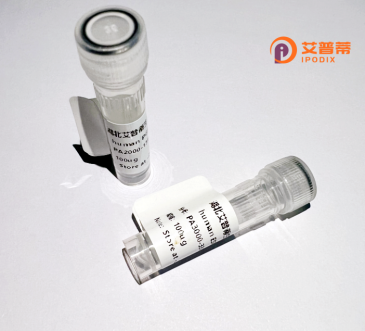
| 纯度 | >90%SDS-PAGE. |
| 种属 | Human |
| 靶点 | ZNF385 |
| Uniprot No | Q96PM9 |
| 内毒素 | < 0.01EU/μg |
| 表达宿主 | E.coli |
| 表达区间 | 1-386 aa |
| 活性数据 | MILGSLSRAG PLPLLRQPPI MQPPLDLKQI LPFPLEPAPT LGLFSNYSTM DPVQKAVLSH TFGGPLLKTK RPVISCNICQ IRFNSQSQAE AHYKGNRHAR RVKGIEAAKT RGREPGVREP GDPAPPGSTP TNGDGVAPRP VSMENGLGPA PGSPEKQPGS PSPPSIPETG QGVTKGEGGT PAPASLPGGS KEEEEKAKRL LYCALCKVAV NSLSQLEAHN KGTKHKTILE ARSGLGPIKA YPRLGPPTPG EPEAPAQDRT FHCEICNVKV NSEVQLKQHI SSRRHRDGVA GKPNPLLSRH KKSRGAGELA GTLTFSKELP KSLAGGLLPS PLAVAAVMAA AAGSPLSLRP APAAPLLQGP PITHPLLHPA PGPIRTAHGP ILFSPY |
| 分子量 | 40.4 kDa |
| 蛋白标签 | His tag N-Terminus |
| 缓冲液 | PBS, pH7.4, containing 0.01% SKL, 1mM DTT, 5% Trehalose and Proclin300. |
| 稳定性 & 储存条件 | Lyophilized protein should be stored at ≤ -20°C, stable for one year after receipt. Reconstituted protein solution can be stored at 2-8°C for 2-7 days. Aliquots of reconstituted samples are stable at ≤ -20°C for 3 months. |
| 复溶 | Always centrifuge tubes before opening.Do not mix by vortex or pipetting. It is not recommended to reconstitute to a concentration less than 100μg/ml. Dissolve the lyophilized protein in distilled water. Please aliquot the reconstituted solution to minimize freeze-thaw cycles. |
1. **《ZNF385B modulates HIF-1α signaling and promotes glycolysis in hepatocellular carcinoma》**
Zhao L., et al.
该研究揭示ZNF385B通过增强HIF-1α的转录活性促进肝癌细胞糖酵解,推动肿瘤进展,为代谢重编程机制提供新见解。
2. **《ZNF385A is a novel regulator of p53-mediated apoptosis in DNA damage response》**
Sakaguchi K., et al.
研究发现ZNF385A与p53直接结合,通过调控促凋亡基因(如BAX、PUMA)的表达,增强DNA损伤后细胞凋亡,揭示其在肿瘤抑制中的作用。
3. **《ZNF385A interacts with RNA-binding proteins to destabilize target mRNAs in cellular stress》**
Huang Y., et al.
提出ZNF385A作为应激条件下RNA结合蛋白复合物的成员,通过降低促存活基因mRNA的稳定性,促进细胞应激应答及周期停滞。
4. **《ZNF385B regulates axonal transport and is implicated in neurodegenerative pathology》**
Lee J.H., et al.
发现ZNF385B缺失导致神经元轴突运输缺陷,并加剧阿尔茨海默病模型中TDP-43蛋白异常聚集,提示其参与神经退行性病变机制。
ZNF385 (Zinc Finger Protein 385), also known as JAZ or DZF, is a member of the C2H2-type zinc finger protein family characterized by multiple zinc finger domains that facilitate DNA-binding and protein-protein interactions. It plays a role in transcriptional regulation, influencing processes such as apoptosis, cell cycle control, and stress response. Studies suggest ZNF385 acts as a tumor suppressor in certain contexts, interacting with p53 to enhance apoptosis, while paradoxically promoting cancer progression in others by aiding metastasis or drug resistance. It exhibits tissue-specific expression, notably in the brain, liver, and reproductive organs. Structurally, ZNF385 contains a nuclear localization signal but can shuttle between the nucleus and cytoplasm, enabling diverse regulatory functions. Its dual role in neuroprotection and neurodegeneration has drawn interest in Alzheimer’s and Parkinson’s research. Recombinant ZNF385 proteins, often produced via bacterial or mammalian expression systems, are vital tools for functional studies, drug screening, and exploring diagnostic or therapeutic applications. Dysregulation of ZNF385 is linked to cancers (e.g., neuroblastoma, breast cancer) and neurological disorders, highlighting its potential as a biomarker or intervention target.
×